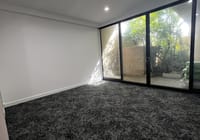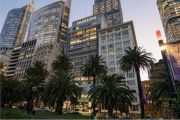
Solar farms $48m deal to offset Barangaroo carbon emissions
Green energy operator CleanPeak Energy will build at least four new solar farms in NSW in a landmark deal that ensures that Sydney’s Barangaroo precinct remains carbon-neutral, whether or not its corporate tenants themselves tap into renewable power.
That capacity to both generate green energy from the solar farms as well as renewable energy certificates – sufficient to offset carbon emissions generated across the 7.5 hectare commercial and residential precinct – is what makes the $48 million deal unique, according to CleanPeak chief executive Philip Graham.

“No one can control how a tenant buys energy,” he told The Australian Financial Review.
“Tenants can do what they want to do. Hopefully all the tenants buy energy from our solar farms, but if they don’t, we’ll at least put all our energy into our usage of the site.”
And for those tenants who are not tapping into green power, their usage will offset by renewable energy certificates, covered through a 25-year Green Product Purchase Agreement between the state government and CleanPeak.
“So we’re guaranteeing the whole precinct, no matter who the tenants choose to use [for energy] or how the tenants are thinking about carbon,” Mr Graham said.
The deal covers so-called Scope 2 emissions, which stem from the consumption of grid-supplied electricity by corporate businesses, shops, restaurants, and residents within the precinct.
Also involved is Lendlease which last year sold to CleanPeak the behind-the-meter network it had hard-wired into its Barangaroo precinct development.
The precinct includes more than 1000 upmarket apartments across the three residential buildings of One Sydney Harbour, retail space and about 284,000 square metres of office space including at its International Towers buildings.
An array of sustainability measures are up and running in Barangaroo already, ranging from rooftop solar to a fly larvae farm which is processing over 10 tonnes of food waste per month.
The solar farms that CleanPeak Energy is developing in regional NSW will add over 50 GWh of clean energy to the state’s renewable energy supply. Construction of the first two solar farms will begin early next year near Moama and Hay, with more projects to follow.
Significantly, the renewable energy certificates generated by CleanPeak’s solar portfolio should be distinguished from the carbon credits produced by landowners, Mr Graham said. The market in carbon credits has come fire over the past year, with questions raised over the integrity of some abatement measures.
By contrast, energy certificates created through solar power generation are the “gold standard in carbon credits”.
“It’s measurable, it’s precise, and it’s known,” he said.
Meanwhile, ASX-listed Stockland has also been busy on the green power front, striking a partnership with distributed energy resources company Energy Bay. The arrangement involved the management of energy generated by rooftop solar arrays above more than 50 of Stockland’s malls and warehouses. Those installations can generate over 50 megawatts peak (MWp) in solar energy.
Under the deal, Stockland will use inter-asset energy trading, allowing for the surplus renewable energy generated on warehouse roofs to be used at its other commercial buildings and in its land lease housing estates.
“The partnership with Energy Bay is a significant step towards our transition to a low carbon future using innovative, scalable, and economically sustainable solutions,” Stockland managing director Tarun Gupta said.
Under the deal, Energy Bay will purchase Stockland’s existing 17 MWp of solar panels, mostly located at town centre malls, and install and own an additional 34 MWp of solar panels across Stockland’s assets by 2025.
For Stockland, the deal means it will use its own rooftops rather than needing more land for solar farms, while avoiding the extra cost of renewable energy power purchasing agreements.











